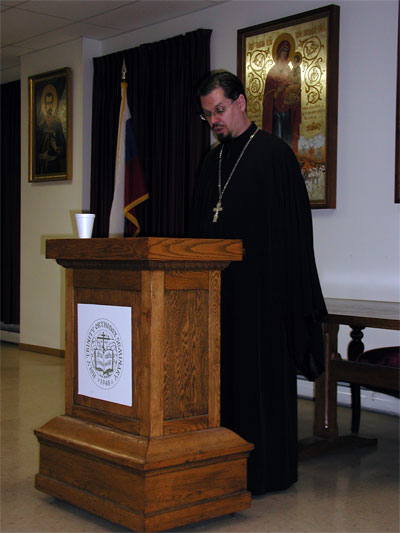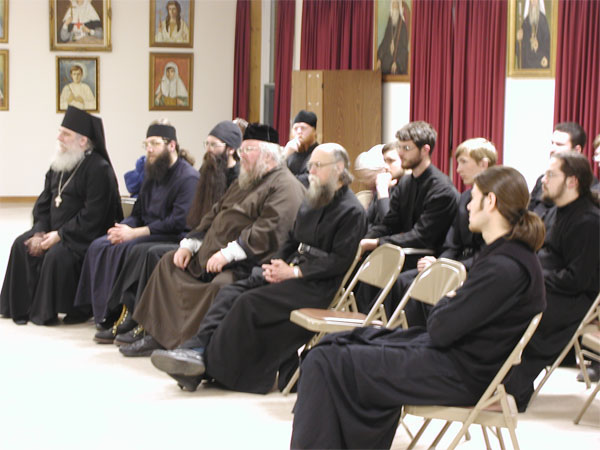Fr. Alexander Rentel Delivers Lecture
 Holy Trinity Seminary was pleased to welcome the Rev. Dr. Alexander Rentel, Instructor of Church History and Canon Law at St. Vladimir's Orthodox Theological Seminary, to Jordanville on May 6, 2004.
Holy Trinity Seminary was pleased to welcome the Rev. Dr. Alexander Rentel, Instructor of Church History and Canon Law at St. Vladimir's Orthodox Theological Seminary, to Jordanville on May 6, 2004.
Following an introduction by Archimandrite Luke, Fr. Alexander delivered a lecture entitled "How the Patriarch Served Liturgy: The Diataxis of Dimitrios Gemistos," which sprang from his recent Ph.D. thesis, a critical edition of Gemistos' fourteenth century rubrics for the conduct of the patriarchal liturgy, the Diataxis. As Fr. Alexander explained, a comparison of Dimitrios Gemistos' Diataxis with other sources reveals that it was composed with the utilization of both the traditional patriarchal rites of Constantinople and the Athonite Diataxis of Philotheos Kokkinos, resulting in a liturgical practice well suited for Constantinopolitan use and modeled on classical practice. The use of the Athonite Diataxis of Philotheos in this aggregate points to both the influence of Athonite, hesychast monasticism on the throne of Constantinople and the final ascendancy of the Byzantine-Palestinian monastic rite over the last vestiges of the cathedral rite. Looking beyond the particular historical situation in which Gemistos' Diataxis was created, Fr. Alexander noted, one can see the developing outline of the transformation the Byzantine Church would undergo through the centuries of Turkish domination.
 Fr. Alexander's comments on how Dimitrios Gemistos' liturgical Diataxis is reflective of the Byzantine vision of divine order were of particular interest: liturgical rubrics such as the Diataxis attempted to prescribe an earthly ritual that would be a mirror of the heavenly ritual and the heavenly order. Fr. Alexander concluded his talk by pointing out that Gemistos was not primarily an innovator, but rather harmonized and systematized existing precedents into the Byzantine cathedral tradition and as such his Diataxis is representative of the natural, continuous evolution of rites that is the stuff of liturgical history.
Fr. Alexander's comments on how Dimitrios Gemistos' liturgical Diataxis is reflective of the Byzantine vision of divine order were of particular interest: liturgical rubrics such as the Diataxis attempted to prescribe an earthly ritual that would be a mirror of the heavenly ritual and the heavenly order. Fr. Alexander concluded his talk by pointing out that Gemistos was not primarily an innovator, but rather harmonized and systematized existing precedents into the Byzantine cathedral tradition and as such his Diataxis is representative of the natural, continuous evolution of rites that is the stuff of liturgical history.
Following his talk numerous questions were taken from the audience, many of them concerning points of liturgical ritual mentioned in the course of the lecture, and tea and refreshments were served.
Holy Trinity Seminary is extremely grateful to Fr. Alexander Rentel for taking the time out of his busy schedule, particularly at the very conclusion of the academic year, to share his remarkable knowledge of liturgical history - an area of particular interest to many of us - with our students.